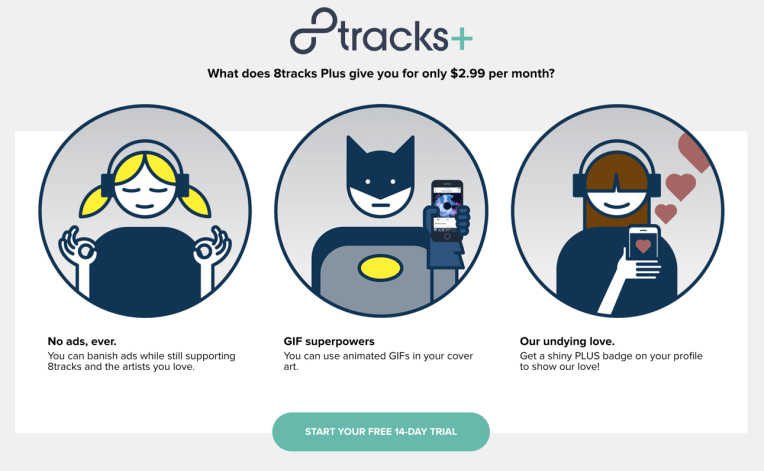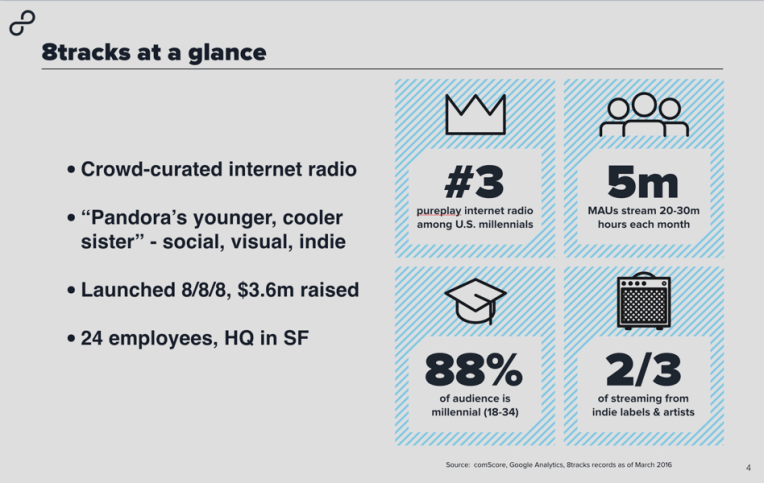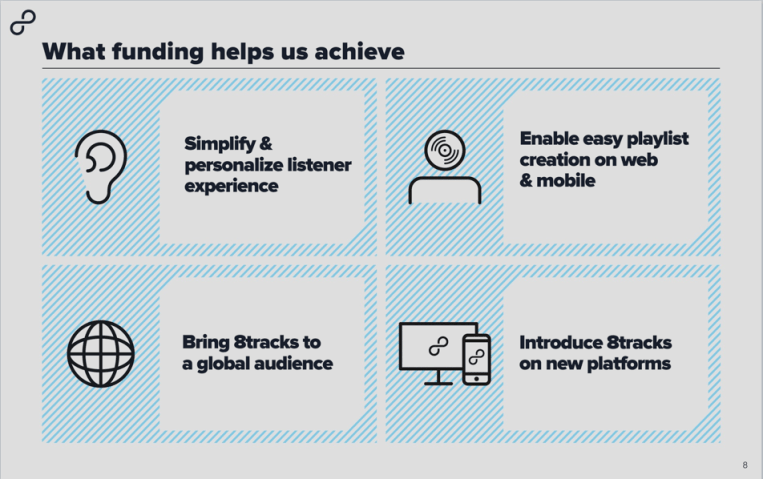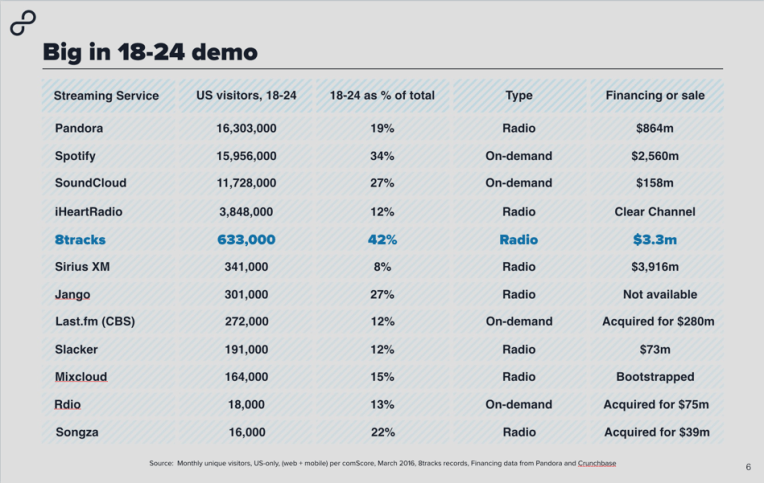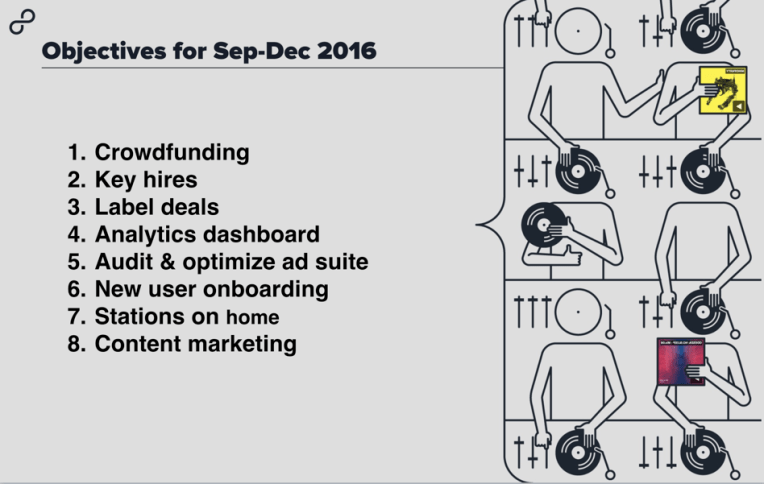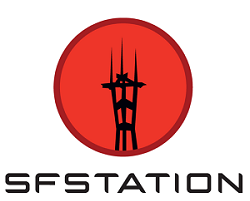Join us as our CEO and Founder, David Porter presents on 8tracks’ strategy and objectives, along with an investor Q&A session during the final 30 minutes. View or download the presentation slides here.
With just two weeks left, our equity crowdfunding campaign on SeedInvest is in the home stretch, ending soon on October 21.
Get shares in 8tracks before the round ends on October 21
1. Any plans to provide offline access to playlists like Spotify does? What about the ability to save tracks from playlists to your own 8tracks playlists?
Porter: So the answer is yes and yes. I will answer the second point first: the ability to add tracks from a playlist to your own 8track playlist. That will happen sooner, and really the gating factor there is having the deals in place to be able to support that, because the only way we can do that is if that track you want to save to your own playlist is available in our library. So if it’s available in our library, then you would be able to essentially favorite that track with a little star icon, and then that track will show up where you make playlists, so you can then add the track to your playlist.
The offline access I am really keen on. I love that feature on Spotify, frankly. I know that’s something which is really a nice differentiator, and the way that we thought about it (and again, this is unlocked by direct deals with labels), is that ideally we would have something where perhaps the last ten playlists you liked are automatically saved for offline access, and then another ten you can save permanently, or not permanently, but you can click a little toggle, not unlike what Spotify does, and make those available for when you are on a flight or on a subway and so forth. So offline access is definitely part of the plan.
That’s something we know has value. It probably will be part of the 8tracks Plus subscription offering, which is $2.99 a month. It’s an exciting feature, and we look forward to it.
2. Can you expand on what features the 8tracks Plus premium offering will have down the road?
Porter: Absolutely. I just kind of alluded to those in the last question, but my vision for 8tracks Plus is really four things.
Thing number one already exists, which is the lack of ads.
Thing two, and perhaps our most requested feature historically over the last eight years is more skips, and so 8tracks Plus will have a much higher skip limit so you don’t have that constraint.
The third thing is offline access, like I mentioned in response to the last question, and I think that will be really compelling.
The fourth thing is a feature that we’ll probably bundle into 8tracks Plus, but that will be part of our DJ offering in the music library we’re building out. Some subset of content will only be available to subscribers. It’s likely the bulk of independent content will be there for any DJ to access for free, but for three bucks a month you also get access to some section of content that likely would include some major label content, for example, and that then allows you to do a few cool things like I just mentioned in the response to the last question.
For example, if you hear a track and you like it, you can favorite it and it automatically gets added to your playlist creation page and then you can make a playlist from that. We had a feature like this in the early days of 8tracks, and it was this wonderful kind of virtuous cycle where you tune into 8tracks with music that you can’t hear anywhere else, or don’t hear anywhere else.
You favorite a list of tracks daily, and then every week or two you are like, “Okay, here is, of these twenty tracks that I favorited, these ten would make a fantastic playlist.” You create your own playlist with those ten tracks and then publish it and share it. It’s kind of this endless virtuous cycle of discovery and sharing, so we think that’s great for everyone: listeners, labels and artists alike. So that’s something we want to recreate with the new deals that we’re doing with the record labels.
3. I have been spending a lot of time exploring playlists on 8tracks, and I’m wondering about audio quality. Playlists are not normalized, and this results in an average user experience of having to adjust volume from song to song. I’m curious on how you plan to address that. Is there any plan to address the playback quality?
Porter: Yes, and great point. That’s actually something that we had experienced at my last company (Live365), where I worked after business school and before starting 8tracks. We developed a way to normalize audio. We haven’t had a ton of feedback on that specific point, but certainly if it made sense, it is something we could focus on sooner, and again, it’s one of those things that we know we would like to do, it’s just a matter of what comes first in the order of operations.
I think probably the most important point here is that we are gradually shifting from a world of uploaded content where people have ripped their CDs or purchased a song from some source and they upload it to 8tracks to create their playlist, and moving from that kind of world to where it’s kind of half-analog and half-streaming to a fully streaming model.
The direct deals that we are doing in all cases include us ingesting content from the aggregator that is in optimal quality, whatever quality we typically ask for and is standardized. So the fact of having these direct deals will obviate a lot of the consumer’s concerns about the variable audio quality. That should get steadily better over time as we do more of these deals, so stay tuned.
4. Do you have a number for current active users, besides the cumulative 17 million users that have registered today?
Porter: Absolutely. The number is five million monthly active users. I think we touched on that in the previous webinar. I’m always very cautious when I throw out the registered users number because I know in some ways that is kind of a bullshit number because it’s not all active, so good on you for calling me out on that, but the monthly active user number is five million. Again, if you look at the historical figures, there has been some decline apart from the aforementioned impact of Spotify and a few problems with pre-roll video on iOS. We also had to restrict streaming outside the US and Canada, so that was a big chunk, and again, that sort of artificially makes the decline look worse than it really is, at least in terms of the U.S. and Canadian audience. That’s the story there.
5. Is there any plan to do cool, original video content produced by 8tracks (acoustic sessions, studio sessions, artist interviews, etc.)?
Porter: Dare I say possibly? So kind of two thoughts: on the one hand, I want to make sure that we’re sticking to our knitting and are focused on the things that will deliver the most value, given extremely limited resources, so I feel like we don’t want to venture too wide.
On the other hand, one of our strengths is clearly this crowdsourced curatorial point-of-view. The first step towards something like that is happening right now with our kind of editorial/content marketing plan. After having done a little bit of research, we’ve heard that some of the best content marketing opportunities are actually video-driven. So we’re thinking a little bit about how we ought to approach that from our perspective, and we have done some of this in years past.
We had a VP of Marketing in the early days—actually, the wife of the Pandora CTO, my friend Tom Conrad. His wife, Kate Imbach, was our first head of marketing, and she did some great interviews with bands and those are up on the blog. So I think there’s a little bit of history there.
We have great connections with some of our partners like Red Light Management and some of the labels, so I think there’s an opportunity there. We just need to make sure we do it the right way. Because we don’t have a lot of in-house expertise on that, I think we need to make a key hire to lead that process, but our first experiment into kind of going beyond our core of playlists and adding in this editorial layer (whether it is text-based or video-based) is this content marketing plan that is being rolled out this next quarter.
6. Most of your competitors in the same industry have challenges reaching a global audience, i.e. Pandora, etc. Have you researched this area and what measures and plans do you have to achieve this, and by when?
Porter: Definitely. So we initially were available globally, and that was the way that we rolled out. In the early days of 8tracks, we didn’t necessarily know where our listener was located. We didn’t have the ability to identify the geographical location of a listener, and so we just kind of streamed and paid everything to Sound Exchange, a U.S. entity.
As we’ve become larger and more sophisticated, we’ve been able to distinguish. As part of us moving forward on bigger label deals, we’ve had to restrict streaming outside the US and Canada. We do intend to bring 8tracks back steadily over time, but I can’t promise to any time table. A lot of it depends on our success with crowdfunding and with the near-term road map. However, what I would say is that we are looking at, really, for any country there is a combination of perhaps three factors that we need to consider, which really relate to that first equation that I led off the presentation with.
First and foremost, are the royalties that we need to pay in that country affordable? Are they set at a level that we can actually have a real business, and relatedly, what is that business model? Because we sell advertising, if we don’t have a huge audience there, that means that we probably can’t justify having a direct sales team there, and therefore need to rely on programmatic advertising where it is sold through third parties or through another partner. So if it’s going to be an advertising model, who is doing the selling and at what levels are the RPMs or CPMs, and how does that map back to that royalty? There’s a little bit of homework to be done on the direct revenue side, and also on the direct cost side to make sure that the unit economics are in fact positive.
That’s one consideration, and the other is if we have a large and growing audience. This is kind of speaking to the ATH or hourly-streamed part of that equation, and relatedly, can we find a distribution partner who can help us drive that. I think the classic example would be finding a country where we could partner with a local mobile operator and we become an option for that service that is perhaps free, maybe with your mobile subscription.
If the operator had sufficient market power, they might be able to help us in negotiating good rates with whatever licensing bodies exist, or at least help navigate the waters with those licensing bodies, and particularly if they have a direct sales force, they too could help with the sales efforts, so we wouldn’t have to rely on programmatic as heavily because they already have salespeople that could be brought to help sell 8tracks.
We really need to look at each market that seems promising and consider those three factors in terms of royalties and a business or revenue model and distribution or marketing partnerships, and from that analysis we can figure which places to target first.
7. Have you guys discussed branching marketing into music festivals and concert series? These events have a large pool of new listeners and potential for long-term members along with the ability to gain support from musicians and DJs.
Porter: We have. A couple of years back as one example, we did a lot of work with Pitchfork. Pitchfork has its festival in Chicago every July, and they created their 8tracks playlist highlighting some of the acts that were going to be performing at the festival on 8tracks. I think there’s an opportunity there.
We don’t have a lot of dollars to promote ourselves there directly, or at least it’s harder to make that argument rationally. I think the best way to consider those opportunities is really in a similar vein where someone involved in the festival or maybe someone involved internally at 8tracks work together to create one or a series of mixtapes for the festival and those are used in the marketing collateral to help promote sales of tickets for the festival, and I think that is a really interesting way to get the word out and have great brand association with some great music events that are happening. It’s definitely interesting.
Again, I think it is a matter of resources. We want to actually build out marketing in a bigger way next year. Then I think that that can certainly be one area of consideration. There are so many things, and we try to take a very sensitive approach. We wouldn’t try and buy everything. We would try to find one or two festivals that were particularly a good fit for 8tracks’ audience and really execute those in a smart way where it is a win-win for everyone. If that goes well, then we can justify doubling down and bringing in more resources to make that a bigger potential marketing channel for the company.
Become an investor before October 21
More Investor Webinars
*Disclaimer: © 8tracks, Inc. (“8tracks”) is offering securities through the use of an Offering Statement that has been qualified by the Securities and Exchange Commission under Tier II of Regulation A. A copy of the Final Offering Circular that forms a part of the Offering Statement may be obtained from seedinvest.com/8tracks/series.a. This Company’s profile and accompanying offering materials may contain forward-looking statements and information relating to, among other things, the Company, its business plan and strategy, and its industry. These statements reflect management’s current views with respect to future events based information currently available and are subject to risks and uncertainties that could cause the Company’s actual results to differ materially. Investors are cautioned not to place undue reliance on these forward-looking statements as they are meant for illustrative purposes and they do not represent guarantees of future results, levels of activity, performance, or achievements, all of which cannot be made. Moreover, no person nor any other person or entity assumes responsibility for the accuracy and completeness of forward-looking statements, and is under no duty to update any such statements to conform them to actual results. 8tracks reserves the right to revise the round closing date at any point. The individuals above were not compensated in exchange for their testimonials. In addition, their testimonials should not be construed as and/or considered investment advice.


